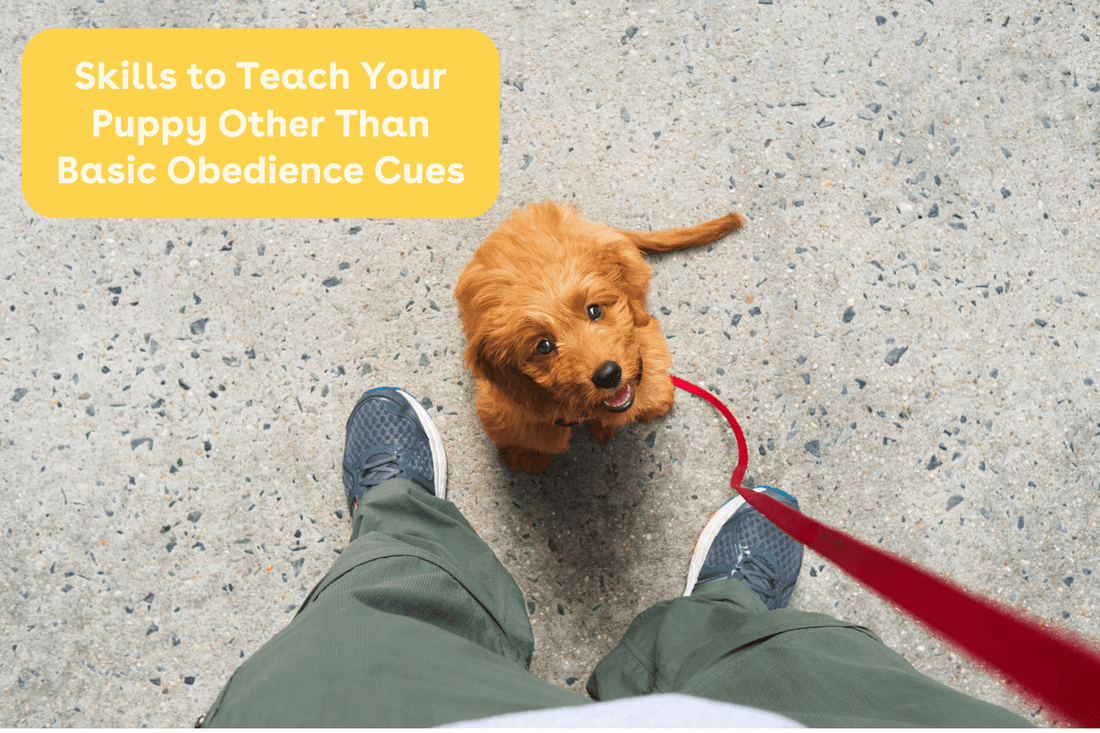Bringing a new puppy into your life is an exhilarating experience. The excitement of watching them grow, learn, and explore their world is unmatched.
While basic obedience cues like sit, stay, and down can be crucial for a well-behaved pup, there's a whole world of education beyond these fundamentals.
In this comprehensive guide, we'll delve into six essential skills that go beyond basic obedience, focusing on Drop it, Recall, Handling, Socialization, Opportunities for Fun & Exploration, and Confidence Building.
Table of Contents:
- Drop It
- Recall
- Handling
- Socialization
- Opportunities for Fun & Exploration
- Confidence Building
Drop it

The "Drop it" cue is more than just preventing your puppy from chewing on your favorite shoes; it can also save them from potential harm if they get a hold of something potentially dangerous to them. Teaching your puppy to drop whatever they have in their mouth on cue is essential for their safety and your peace of mind.
To teach this cue, start with a desirable toy and encourage your puppy to hold it in their mouth. Then, offer a high-value treat while saying "Drop it" in a gentle but firm tone. When they release the toy, praise them enthusiastically and reward them with the treat.
Consistency is key; practice this cue in various scenarios with different objects to reinforce it effectively.
Related Reading: First Things to Teach a Puppy
Recall

Recall, or coming when called, is one of the most important skills your puppy can have - and it’s never to early to start working on it. A reliable recall ensures that your pup can return to you promptly, even when distractions abound.
Begin training recall in a low-distraction environment, such as your living room or backyard. Start by just playing games, such as encouraging and rewarding your puppy for following you.
Use a positive, upbeat tone and enticing rewards like treats or toys to motivate your puppy to come to you. Gradually increase the difficulty by introducing distractions, such as other people or dogs.
Always reward your puppy generously when they come to you, reinforcing the behavior with praise and treats.
Check out our 7-Day Recall Challenge for more tips and tricks!
Handling

Proper handling is crucial for grooming, veterinary visits, and everyday interactions with your puppy. Getting them accustomed to being touched, examined, and handled from an early age will make these experiences less stressful for both of you.
Start by gently touching various parts of your puppy's body, including their ears, paws, tail, and mouth, while offering treats and praise. Gradually increase the intensity and duration of the handling to mimic real-life situations.
Introduce grooming tools like brushes and nail clippers gradually, associating them with positive experiences through treats and praise. Consistent, gentle handling will help build trust between you and your puppy, making grooming and veterinary care a breeze.
Watch a demo of how to work on handling skills!
Socialization

Socialization is vital for a well-rounded, confident dog. Exposing your puppy to different people, animals, environments, objects, and stimuli during their critical socialization period (typically between 3 and 16 weeks of age) lays the foundation for positive social interactions throughout their life.
Take your puppy on outings to various places, such as parks, pet stores, and cafes, exposing them to different sights, sounds, and smells. Arrange playdates with other vaccinated, friendly dogs to help your puppy learn appropriate social cues and communication skills.
Supervise all interactions closely, intervening if necessary to prevent negative experiences. Positive socialization experiences during puppyhood will contribute to a well-adjusted, sociable adult dog.
Check out our Puppy Socialization Checklist for ideas of what to socialize your puppy too!
Opportunities for Fun & Exploration

While training is essential, so is allowing your puppy to be a dog and have fun. Incorporate plenty of playtime, exploration, and enrichment activities into your puppy's daily routine to keep them mentally and physically stimulated.
Provide a variety of toys, puzzles, and games that cater to your puppy's natural instincts and interests. Interactive toys like Kong toys stuffed with treats, puzzle feeders, and flirt poles are excellent options for keeping your puppy engaged and entertained.
Rotate toys regularly to prevent boredom and keep your puppy's interest piqued. Additionally, schedule regular outdoor adventures, such as hikes, beach trips, or visits to dog-friendly parks, to provide opportunities for exploration and sensory stimulation.
Confidence Building

Building confidence in your puppy is essential for their emotional well-being and overall behavior. Confidence helps them navigate new experiences, overcome challenges, and adapt to various environments with ease.
To build your puppy's confidence, expose them to a variety of stimuli in a positive, controlled manner. Start with small challenges and gradually increase the difficulty as your puppy gains confidence. Offer plenty of praise, encouragement, and rewards for brave behavior, reinforcing their sense of accomplishment.
Engage in activities that boost your puppy's confidence, such as basic agility training, trick training, or canine sports like agility or flyball. Celebrate every success, no matter how small, to foster a can-do attitude in your puppy.
Skills To Teach Your Puppy Other Than Basic Obedience Cues Recap
Training your puppy extends far beyond basic obedience cues. Teaching skills like Drop it and Recall, ensuring they're comfortable with handling, prioritizing socialization, providing opportunities for fun, and building confidence are all essential aspects of raising a happy, well-adjusted dog.
By incorporating these teachings into your puppy's training regimen, you'll set them up for a lifetime of success and companionship. Remember, patience, consistency, and positive reinforcement are the keys to effective training and building a strong bond with your furry friend.
For even more training tips and tricks, enroll in Pupford Academy + today!









